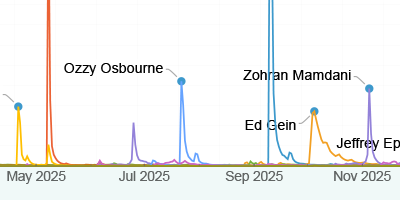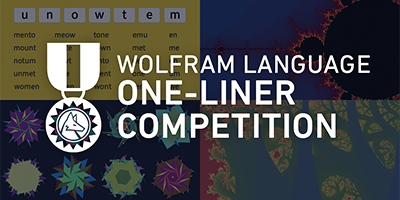New Interactive Course Teaches Useful Tips from an Expert Programmer

Wolfram Language has a wealth of built-in functions that require little or no programming, but there are special cases that require additional skill and knowledge to get the code to do things that go beyond those built-in capabilities. Wolfram U is pleased to announce a new free interactive course by veteran Wolfram programmer and instructor Dave Withoff that offers a collection of useful tips and instruction for intermediate-level programmers. This course will expand your understanding of Wolfram Language and help you to write more complex programs for custom results.
Let me start by saying that for beginners to the language, the free interactive course An Elementary Introduction to the Wolfram Language continues to be the best way to start learning how to write programs with Wolfram Language. A Guide to Programming with Wolfram Language is intended as a follow-on course for users who are ready to delve deeper into the language.
If you’re already familiar with the language and prepared to dive in to more advanced topics, you can explore the interactive course by clicking the following image before reading the rest of the blog post.
Motivation from History
To introduce Wolfram Language and modern computational thinking to the world, Stephen Wolfram published An Elementary Introduction to the Wolfram Language in 2015. Functionality gains for the Wolfram Cloud soon made it possible to turn the book into a full interactive online course that includes videos, exercises and a scratch notebook in an easy-to-use interface, available to anyone with an internet connection. Indeed, lessons from the introductory course have been viewed over a million times on computers, tablets and smartphones around the globe since its launch.
The new intermediate-level programming course grew out of user interest for more advanced lessons and a desire to address questions from experienced users related to topics such as assignments and evaluation rules, patterns, program interfaces and plotting. Dave Withoff has been using Wolfram Language since the release of Mathematica 1.2 in 1989. Dave was a developer of packages and internal code for early versions of Mathematica and is an experienced instructor in the world of academia and with Wolfram U. He has used his expertise with the language to create the new course lessons, sharing tips and techniques he has developed over the years.
Overview
Students should have some knowledge of Wolfram Language programming before they begin the course, which includes intermediate-level topics, such as the structure of expressions, variable localization and other details about the basic design of the system. Later sections include lessons on speed and memory efficiency, construction of interactive user interfaces, data visualization and debugging.
Here is a quick look at some of the lessons included in the course (shown in the table of contents in the left-hand column):

Even though the content goes beyond the introductory level, it should not take very long to complete this course. You should be able to finish the 22 short videos and eight quizzes in about four hours. The course tracks your progress automatically and generates your personalized certificate of course completion when you finish.
The next few sections of the blog post describe the different interactive course components in detail.
Lessons
The body of the course is a set of 22 lessons, starting with “Multiparadigm Programming.” This introductory lesson uses hands-on examples to illustrate different programming styles, followed by dedicated lessons on functional and rule-based programming that demonstrate different ways of writing programs in Wolfram Language.

Course sections include “Basic Language Structure,” “Values and Variables,” “Common Special Expressions,” “Program Interfaces,” “Plotting,” “Analyzing and Optimizing Programs” and “Selected Applications.” Each section has two or three lessons and an auto-graded quiz to test your understanding.
The videos range from 6 to 15 minutes in length, and each video is accompanied by a lesson notebook displayed on the right-hand side of the screen. There is an embedded scratch notebook where you can copy and paste Wolfram Language input directly from the lesson so you can try the examples for yourself.
Exercises
Each lesson comes with a set of exercises to practice the concepts. A detailed solution is provided for every exercise because the course is designed for independent study. The following shows an example from the lesson on knowledge representation, from the “Program Interfaces” section:

The notebooks with the exercises are interactive, so students can try variations of each problem in the Wolfram Cloud. In particular, they are encouraged to change the variables in examples and investigate the documentation and options available for built-in functions.
Quizzes
At the end of each section is a short, multiple-choice quiz with 10 problems. The quiz problems are at roughly the same level as those shown in the lessons, and a student who reviews the section thoroughly should have no difficulty in doing well on the quiz.

Students will receive instant feedback about their answers to the quiz questions, and they are encouraged to try hand and computer calculations to solve them.
Certifications Available
Students are encouraged to watch all the lessons and attempt the quizzes in the recommended sequence because course topics may rely on earlier concepts and techniques. When you complete the course, you can download a personalized certificate of completion. You will earn a course certificate after watching all the lessons and passing all the quizzes. Your progress is tracked automatically for you within the course using your Wolfram ID, making it easy to just pick up where you left off if you exit and return to the course later. A course certificate adds value to your professional resume, school and job applications or social media profile. This course provides useful preparation for the Wolfram Language Level I certification exam, and students are encouraged to take the exam and earn a proficiency certification.

Feedback from Daily Study Group Participants
Wolfram U offered a sneak peek of the course lessons and quizzes to Daily Study Group participants this spring, and we received some valuable feedback. Here is what participants said:
- “This course improves efficiency by enabling me to keypunch less and giving me the knowledge to reduce computer run time.”
- “[Exercises] are always helpful and fun.”
- “Multiple Choice questions are adequate to test one’s knowledge. The best exercises were those when we were asked to program a solution for a problem with a specific outcome. It shows the versatility of Wolfram Language.”
- “I refer to the various notebooks included in the course to serve as examples and demonstrations of concepts applicable to the task on which I am working. Those dealing with symbolic computation are most helpful.”
- “The programming guide was very helpful, provided insights into the language.”
A Building Block for Success
I think you’ll find this new interactive course to be an enjoyable learning experience on your journey to become a more advanced and skilled user of Wolfram Language, just like our Daily Study Group cohort did. I hope you’ll reach out to let us know about the ways you find the course helpful and to share stories about your results. As always, we welcome any comments or suggestions for future courses and certifications.
Acknowledgments
I’m grateful to Andre Kuzniarek at Wolfram for suggesting the course concept; to the author, Dave Withoff, for answering the call to create this collection of programming topics; and to the Wolfram U staff who contributed to making it a reality. I would specifically like to acknowledge Cassidy Hinkle, Laura Crawford and Mariah Laugesen of the Wolfram U team.
| Want more help? Register for one of Wolfram U’s Daily Study Groups. |




Comments